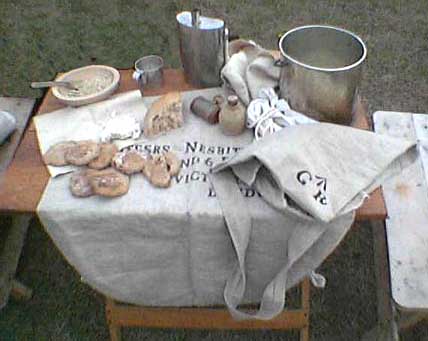|
|
|



|
The British army was the best fed army in the world during the time of the French & Indian war. The British Parliament passed the Vectualing act which guaranteed every soldier would receive each day a one pound loaf of bread, and one pound of beef; this amount may be increased during times of war, as the laboring soldiers require more food to maintain their strength. If fresh bread or beef were unavailable, they were substituted by an amount equal to that of fresh or salt pork, hardtack, flour, or in America, Indian corn. Other victuals were issued to soldiers when available, such as: fruits, vegetables, and cheese. Rations were not issued daily, instead a soldier would receive several days worth or more at one time, it was up to the soldier to make sure his rations lasted. The food issued to the soldiers was paid for by stoppages to the men's wages. His daily ration was not the only source for a soldier's food, Suttlers followed the army selling food and liquor to the officers and soldiers. Suttlers provided the soldiers with such things as, beer, rum, gin, tea, chocolate, sugar, fruits & vegetables, fish, tobacco, and more. The women of the army were also issued food by the army, women campfollowers received half of a soldier's ration, and children a quarter ration. The soldiers of each company formed 'messes' of 5 or 6 men, who also shared a tent together. Each mess was issued a tin mess kettle used for cooking their victuals. When raw meat was issued, the men would boil them in their kettle until edible, or roast them over a fire. Often the men would combine their bread, meat, vegetables, and whatever else they had at hand into their kettles to form a sort of soup. When raw flour was issued, the men mixed it with water and baked them over hot coals to make flour cakes. When time permitted, each company built an earthen oven called a 'camp kitchen' to cook with. A camp kitchen was simply a mound of dirt with several small ovens built into it, in this way the heat was centralized and less wood was needed. The above mentioned represents the ideal standards in the British army. In times of war, and in the wilderness conditions of North America, food and water was often hard to acquire, transport, or easily spoiled Below are some entries concerning victuals on Braddock's campaign in 1755. |
|
Every man will be allowd every day as much fresh or salt provision & bread or Flower, without any stoppag for the same, As long & in as great proportions as it will be posable to provide them unless any man should be found drunk, Negligent or Disobedient, in such case this gratuity shall be stopped. HOB for March 27, 1755
Tomorrow at Orderly time the Adjts are to deliver in a return of the number of Servts. who are not soldiers amd for whom provisions are to be drawn and also of their women that provisions are to be drawn for. HOB for March 28, 1755
Men that shall be seen drunk shall be stopd one weeks provisions. HOB, General Order for March 31, 1755
We drew indian corn for 6 days and hard that we was to march Tuesday following. CRC for April 23, 1755
One jill of Rum mixt with Three jills of water may be allowd to each man per day which the Officers of the picquet are to see delivered out at 11 oClock. HOB for May 21 1755
This day our hunter shot us two elks and one bear and a dear and wounded two more. CRC for June 5, 1755
Sir Peter Halketts regt. to receive two day's provisions, as ye women are to receive eight day's provisions, The men are to receive theirs at 3 oClock this afternoon & the women at Six. HOB for June 6, 1755
An officer of a Company to go to the suttlers with two men of a tent and so see delivered to every three men yt desires it One pint of spirits or any less that they shall desire. They are to mix it with a propotionable quanity of water. HOB for June 7, 1755
This day came in two companies of Sir Peter Halkets Regt. with two hundred horses loaden with flower and bread from the grand army. CRC for June 15, 1755
We began to be scarce in Provisions that we only received three quarters of a pound of Flower and half a pd of Bacon each day pr man, the other provisions being so far behind and the wagons so loaded and wanting of horses. CRC for July 2, 1755
The men that had anything to eat they eat it for their breckfast, it being then about half an hour after nine, but I believe where there was one that had anything to eat there was twenty that had nothing. CRC for July 9, 1755
HOB, Halkett's Orderly Book CRC, The Journal of Captain Robert Cholmley's Batman
|
Created by ![]() Ryan Gale Designs: rrgale@msn.com
Ryan Gale Designs: rrgale@msn.com